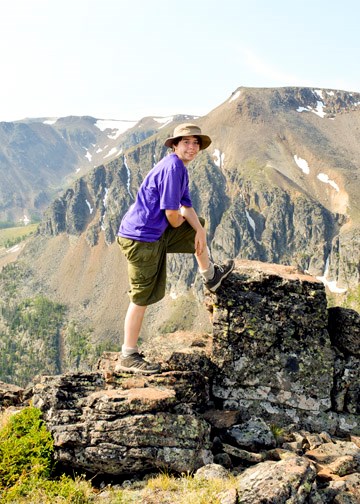A routine mountain biking trip on the trails among the mountains in Vernon, B.C. suddenly took an exciting turn as a baby bear jumped out in front a group of cadets, nearly knocked over the team leader, while not far away, the mother bear watched closely, ready to make a move.
This was the scenario 15-year-old Catherine Kroeker described when asked about her most memorable moment during her two-week Expedition Instructor course at Vernon Army Cadet Summer Training Centre, which she began on July.
"We basically got out of there as quick as we could," said Catherine. "It was pretty exciting though, it was my first bear (encounter)."
It may have been her first bear, but it wasn't her first time in B.C. As a member of the army cadets, her first trip out of the province was last summer, when she participated in the Expedition Instructor course's three-week program that focuses more on basic leadership skills, first-aid and less-intensive exercises. This year, everything was taken to another level.
A major part of their summer's training is an 18-day expedition that takes them by canoe, mountain bike and foot from Sicamous, BC, to Cathedral Provincial Park near the United States border. Cadets paddle the Shuswap River and Mara Lake, hike the Larch Hills and the mountains in Cathedral Provincial Park. They also mountain bike the Kettle Valley Railway, covering 360 kilometres.
"Some nights during our rest days we would stay up until about 11 stargazing. It's the most beautiful thing you could ever imagine. There are so many constellations, and we saw a few shooting stars, satellites, it was really relaxing," said Catherine, while also noting the friendships she developed on her trip. "It was probably the best summer I've ever had."
This bold statement comes as a result of several of the expedition's elements coming together to create a unique balance of hard work and fun, according to Wayne Emde, community public relations officer for the Vernon Army Cadet Summer Training Centre.
"That's a big part about this entire experience, building those friendships," explained Emde. "The kids don't have to be here, it's a volunteer thing, so the other goal, of course, is that it has to be fun. It can be hard and testing sometimes, but at the same time there's a huge emphasis on it being fun, because if it's not, the cadets won't come back."
Before any mention about how the experience can be fun, Emde said above all else, one important factor is brought up.
"The one emphasis the commanding officer has at the start of every meeting begins with 'let's keep them safe, don't let anyone get hurt.' The parents send their kids here and they trust us with them," he said.
Confidence is something the kids gain quickly as they conquer each task they've been assigned to complete.
"They have this 'we did this,' look on their faces. There's a little swagger to them, and it's really nice to see," Emde admitted. "As they age, they take on increasing levels of responsability as well."
For Catherine, next year's outing to B.C. will require her to work as a staff member on site that will require her to utilize all her experience and leadership skills obtained to date.
Estevan's Cadet commanding officer, Craig Bird, said there are a number of things cadets can take away from an out-of-province experience that can't be obtained locally.
"It's a program where kids are able to initially travel to different parts of the province, as well as take part in training outside of the province, pretty much anywhere in Canada. If they like the outdoors and the survival-type of training like first-aid, mountain biking, canoeing, hiking and navigation skills, they will benefit a lot from these extra-curricular portions of training," he said. "Trekking through the mountains is just not something we can do here in Saskatchewan."
The absence of any cost to the parent or child is also something Bird noted, and was emphasized by Catherine, who was paid a total of $360 to embark on the trip to B.C.
"The uniforms are provided to the kids, and they are under adult supervision throughout their time with the cadet program," he said
Catherine, Emde and Bird each emphasized the common misconception about the cadets and their role as a recruiting tool for the army.
"It couldn't be further from the truth. The Department of National Defense sponsors the army cadets because they feel like it's a good learning tool that teaches them self-discipline and self-reliance. They take a huge stride in looking after children who might not be able to afford other activities and organized sports," explained Bird.
Catherine highlighted some of the reasons people misunderstand the program, but said ultimately its purpose is simple.
"We march and shoot pellet rifles and we learn about the history of war and our country, but (the cadets) aren't designed to get people started in the military. It's mainly this entire group for people to make friends and learn about discipline and respect. It's actually just this, awesome program."
The Estevan Army Cadets had their first regular Monday meeting on Sept. 1 and welcomed the new recruits on Sept. 8.




